- Home
- Wilkie Collins
Hide and Seek Page 37
Hide and Seek Read online
Page 37
"What can be the matter with me? I never felt so miserable about going away from home before." Puzzling himself uselessly with such reflections as these, he went to the supper-table, and drank a glass of wine, picked a bit of a sandwich, and unnecessarily spoilt the appearance of two sponge cakes, by absently breaking a small piece off each of them. He was in no better humor for eating or drinking, than for whistling; so he wisely determined to light his candle forthwith, and go to bed.
After extinguishing the lights that had been burning on the supper-table, he cast a parting glance all round the room, and was then about to leave it, when the drawing of the old five-barred gate, which he had taken down for Mat to look at, and had placed on a painting-stand at the lower end of the studio, caught his eye. He advanced towards it directly—stopped half-way—hesitated—yawned—shivered a little—thought to himself that it was not worth while to trouble about hanging the drawing up over the garden door, that night—and so, yawning again, turned on his heel and left the studio.
Mr. Blyth's two servants slept up-stairs. About ten minutes after their master had ascended to his bed-room, they left the kitchen for their dormitory on the garret floor. Patty, the housemaid, stopped as she passed the painting room, to look in, and see that the lights were out, and the fire safe for the night. Polly, the cook, went on with the bedroom candle; and, after having ascended the stairs as far as the first landing from the hall, discreetly bethought herself of the garden door, the general care and superintendence of which was properly attached to her department in the household.
"I say, did you lock the garden door?" said Polly to Patty through the banisters.
"Yes; I did it when I took up master's tea," said Patty to Polly, appearing lazily in the hall, after one sleepy look round the fast-darkening studio.
"Hadn't you better see to it again, to make sure?" suggested the cautious cook.
"Hadn't you? It's your place," retorted the careless house-maid.
"Hush!" whispered Valentine, suddenly appearing on the landing above Polly, from his bedroom, arrayed in his flannel dressing-gown and nightcap. "Don't talk here, or you'll disturb your mistress. Go up to bed, and talk there. Good night."
"Good night, sir," answered together the two faithful female dependents of the house of Blyth, obeying their master's order with simpering docility, and deferring to a future opportunity all further considerations connected with the garden door.
The fire was fading out fast in the studio grate. Now and then, at long intervals, a thin tongue of flame leapt up faintly against the ever-invading gloom, flickered for an instant over the brighter and more prominent objects in the room, then dropped back again into darkness. The profound silence was only interrupted by those weird house-noises which live in the death of night and die in the life of day; by that sudden crackling in the wall, by that mysterious creaking in the furniture, by those still small ghostly sounds from inanimate bodies, which we have all been startled by, over and over again, while lingering at our book after the rest of the family are asleep in bed, while waiting up for a friend who is out late, or while watching alone through the dark hours in a sick chamber. Excepting such occasional night-noises as these, so familiar, yet always so strange, the perfect tranquillity of the studio remained undisturbed for nearly an hour after Mr. Blyth had left it. No neighbors came home in cabs, no bawling drunken men wandered into the remote country fastnesses of the new suburb. The night-breeze, blowing in from the fields, was too light to be audible. The watch-dog in the nurseryman's garden hard by, was as quiet on this particular night as if he had actually barked himself dumb at last. Outside the house, as well as inside, the drowsy reign of old primeval Quiet was undisturbed by the innovating vagaries of the rebel, Noise.
Undisturbed, till the clock in the hall pointed to a quarter past eleven. Then there came softly and slowly up the iron stairs that led from the back garden to the studio, a sound of footsteps. When these ceased, the door at the lower end of the room was opened gently from outside, and the black bulky figure of Mat appeared on the threshold, lowering out gloomily against a back-ground of starry sky.
He stepped into the painting-room, and closed the door quietly behind him; stood listening anxiously in the darkness for a moment or two; then pulling from his pocket the wax taper and the matches which he had bought that afternoon, immediately provided himself with a light.
While the wick of the taper was burning up, he listened again. Except the sound of his own heavy breathing, all was quiet around him. He advanced at once to the bureau, starting involuntarily as he brushed by Mr. Blyth's lay figure with the Spanish hat and the Roman toga; and cursing it under his breath for standing in his way, as if it had been a living creature. The door leading from the studio into the passage of the house was not quite closed; but he never noticed this as he passed to the bureau, though it stood close to the chink left between the door and the post. He had the false key in his hand; he knew that he should be in possession of the Hair Bracelet in another moment; and, his impatience for once getting the better of his cunning, he pounced on the bureau, without looking aside first either to the right or the left.
He had unlocked it, had pulled open the inner drawer, had taken out the Hair Bracelet, and was just examining it closely by the light of his taper (after having locked the bureau again)—when a faint sound on the staircase of the house caught his ear.
At the same instant, a thin streak of candle-light flashed on him through the narrow chink between the hardly-closed door and the doorpost. It increased rapidly in intensity, as the sound of softly-advancing footsteps now grew more and more distinct from the stone passage leading to the interior of the house.
He had the presence of mind to extinguish his taper, to thrust the Hair Bracelet into his pocket, and to move across softly from the bureau (which stood against the lock-side doorpost) to the wall (which was by the hinge-side doorpost); so that the door itself might open back upon him, and thus keep him concealed from the view of any person entering the room. He had the presence of mind to take these precautions instantly; but he had not self-control enough to suppress the involuntary exclamation which burst from his lips, at the moment when the thin streak of candle-light first flashed into his eyes. A violent spasmodic action contracted the muscles of his throat. He clenched his fist in a fury of suppressed rage against himself, as he felt that his own voice had turned traitor and betrayed him.
The light came close: the door opened—opened gently, till it just touched him as he stood with his back against the wall.
For one instant his heart stopped; the next, it burst into action again with a heave, and the blood rushed hotly through every vein all over him, as his wrought-up nerves of mind and body relaxed together under a sense of ineffable relief. He was saved almost by a miracle from the inevitable consequence of the rash exclamation that had escaped him. It was Madonna who had opened the door—it was the deaf and dumb girl whom he now saw walking into the studio.
She had been taking her working materials out of the tobacco-pouch in her own room before going to bed, and had then missed her mother-of-pearl bodkin-case. Suspecting immediately that she must have dropped it in the studio, and fearing that it might be trodden on and crushed if she left it there until the next morning, she had now stolen downstairs by herself to look for it. Her hair, not yet put up for the night, was combed back from her face, and hung lightly down in long silky folds over her shoulders. Her complexion looked more exquisitely clear and pure than ever, set off as it was by the white dressing-gown which now clothed her. She had a pretty little red and blue china candlestick, given to her by Mrs. Blyth, in her hand; and, holding the light above her, advanced slowly from the studio doorway, with her eyes bent on the ground, searching anxiously for the missing bodkin-case.
Mat's resolution was taken the moment he caught sight of her. He never stirred an inch from his place of concealment, until she had advanced three or four paces into the room, and had her back turned full upon him. Then
quietly stepping a little forward from the door, but still keeping well behind her, he blew out her candle, just as she was raising it over her head, and looking down intently on the floor in front of her.
He had calculated, rightly enough, on being able to execute this maneuver with impunity from discovery, knowing that she was incapable of hearing the sound of his breath when he blew her candle out, and that the darkness would afterwards not only effectually shield him from detection, but also oblige her to leave him alone in the room again, while she went to get another light. He had not calculated, however, on the serious effect which the success of his stratagem would have upon her nerves, for he knew nothing of the horror which the loss of her sense of hearing caused her always to feel when she was left in darkness; and he had not stopped to consider that by depriving her of her light, he was depriving her of that all-important guiding sense of sight, the loss of which she could not supply in the dark, as others could, by the exercise of the ear.
The instant he blew her candle out, she dropped the china candlestick, in a paroxysm of terror. It fell, and broke, with a deadened sound, on one of the many portfolios lying on the floor about her. He had hardly time to hear this happen, before the dumb moaning, the inarticulate cry of fear which was all that the poor panic-stricken girl could utter, rose low, shuddering, and ceaseless, in the darkness—so close at his ear, that he fancied he could feel her breath palpitating quick and warm on his cheek.
If she should touch him? If she should be sensible of the motion of his foot on the floor, as she had been sensible of the motion of Zack's, when young Thorpe offered her the glass of wine at supper-time? It was a risk to remain still—it was a risk to move! He stood as helpless even as the helpless creature near him. That low, ceaseless, dumb moaning, smote so painfully on his heart, roused up so fearfully the rude superstitious fancies lying in wait within him, in connection with the lost and dead Mary Grice, that the sweat broke out on his face, the coldness of sharp mental suffering seized on his limbs, the fever of unutterable expectation parched up his throat, and mouth, and lips; and for the first time, perhaps, in his existence, he felt the chillness of mortal dread running through him to his very soul—he, who amid perils of seas and wildernesses, and horrors of hunger and thirst, had played familiarly with his own life for more than twenty years past, as a child plays familiarly with an old toy.
He knew not how long it was before the dumb moaning seemed to grow fainter; to be less fearfully close to him; to change into what sounded, at one moment, like a shivering of her whole body; at another, like a rustling of her garments; at a third, like a slow scraping of her hands over the table on the other side of her, and of her feet over the floor. She had summoned courage enough at last to move, and to grope her way out—he knew it as he listened. He heard her touch the edge of the half-opened door; he heard the still sound of her first footfall on the stone passage outside; then the noise of her hand drawn along the wall; then the lessening gasps of her affrighted breathing as she gained the stairs.
When she was gone, and the change and comfort of silence and solitude stole over him, his power of thinking, his cunning and resolution began to return. Listening yet a little while, and hearing no sound of any disturbance among the sleepers in the house, he ventured to light one of his matches; and, by the brief flicker that it afforded, picked his way noiselessly through the lumber in the studio, and gained the garden door. In a minute he was out again in the open air. In a minute more, he had got over the garden wall, and was walking freely along the lonely road of the new suburb, with the Hair Bracelet safe in his pocket.
At first, he did not attempt to take it out and examine it. He had not felt the slightest scruple beforehand; he did not feel the slightest remorse now, in connection with the Bracelet, and with his manner of obtaining possession of it. Callous, however, as he was in this direction, he was sensitive in another. There was both regret and repentance in him, as he thought of the deaf and dumb girl, and of the paroxysm of terror he had caused her. How patiently and prettily she had tried to explain to him her gratitude for his gift, and the use she meant to put it to; and how cruelly he had made her suffer in return! "I wish I hadn't frighted her so," said Mat to himself; thinking of this in his own rough way, as he walked rapidly homewards. "I wish I hadn't frighted her so."
But his impatience to examine the Bracelet got the better of his repentance, as it had already got the better of every other thought and feeling in him. He stopped under a gas lamp, and drew his prize out of his pocket. He could see that it was made of two kinds of hair, and that something was engraved on the flat gold of the clasp. But his hand shook, his eyes were dimmer than usual, the light was too high above him, and try as he might he could make out nothing clearly.
He put the Bracelet into his pocket again, and, muttering to himself impatiently, made for Kirk Street at his utmost speed. His landlord's wife happened to be in the passage when he opened the door. Without the ceremony of a single preliminary word, he astonished her by taking her candle out of her hand, and instantly disappearing up-stairs with it. Zack had not come from the theater—he had the lodgings to himself—he could examine the hair Bracelet in perfect freedom.
His first look was at the clasp. By holding it close to the flame of the candle, he succeeded in reading the letters engraved on it.
"M. G. In memory of S. G."
"Mary Grice. In memory of Susan Grice." Mat's hand closed fast on the Bracelet—and dropped heavily on his knee, as he uttered those words.
* * * * * *
The pantomime which Zack had gone to see, was so lengthened out by encores of incidental songs and dances, that it was not over till close on midnight. When he left the theater, the physical consequences of breathing a vitiated atmosphere made themselves felt immediately in the regions of his mouth, throat, and stomach. Those ardent aspirations in the direction of shell-fish and malt liquor, which it is especially the mission of the English drama to create, overcame him as he issued into the fresh air, and took him to the local oyster shop for refreshment and change of scene.
Having the immediate prospect of the private Drawing Academy vividly and menacingly present before his eyes, Zack thought of the future for once in his life, and astonished the ministering vassals of the oyster shop (with all of whom he was on terms of intimate friendship), by enjoying himself with exemplary moderation at the festive board. When he had done supper, and was on his way to bed at the tobacconist's across the road, it is actually not too much to say that he was sober and subdued enough to have borne inspection by the President and Council of the Royal Academy, as a model student of the Fine Arts.
It was rather a surprise to him not to hear his friend snoring when he let himself into the passage, but his surprise rose to blank astonishment when he entered the front room, and saw the employment on which his fellow lodger was engaged.
Mat was sitting by the table, with his rifle laid across his knees, and was scouring the barrel bright with a piece of sand paper. By his side was an unsnuffed candle, an empty bottle, and a tumbler with a little raw brandy left in the bottom of it. His face, when he looked up, showed that he had been drinking hard. There was a stare in his eyes that was at once fierce and vacant, and a hard, fixed, unnatural smile on his lips which Zack did not at all like to see.
"Why, Mat, old boy!" he said soothingly, "you look a little out of sorts. What's wrong?"
Mat scoured away at the barrel of the gun harder than ever, and gave no answer.
"What, in the name of wonder, can you be scouring your rifle for to-night?" continued young Thorpe. "You have never yet touched it since you brought it into the house. What can you possibly want with it now? We don't shoot birds in England with rifle bullets."
"A rifle bullet will do for my game, if I put it up," said Mat, suddenly and fiercely fixing his eyes on Zack.
"What game does he mean?" thought young Thorpe. "He's been drinking himself pretty nearly drunk. Can anything have happened to him since we parte
d company at the theater?—I should like to find out; but he's such an old savage when the brandy's in his head, that I don't half like to question him—"
Here Zack's reflections were interrupted by the voice of his eccentric friend.
"Did you ever meet with a man of the name of Carr?" asked Mat. He looked away from young Thorpe, keeping his eyes steadily on the rifle, and rubbing hard at the barrel, as he put this question.
"No," said Zack. "Not that I can remember."
Mat left off cleaning the gun, and began to fumble awkwardly in one of his pockets. After some little time, he produced what appeared to Zack to be an inordinately long letter, written in a cramped hand, and superscribed apparently with two long lines of inscription, instead of an ordinary address. Opening this strange-looking document, Mat guided himself a little way down the lines on the first page with a very unsteady forefinger—stopped, and read somewhat anxiously and with evident difficulty—then put the letter back in his pocket, dropped his eyes once more on the gun in his lap, and said with a strong emphasis on the Christian name:—
"Arthur Carr?"
"No," returned Zack. "I never met with a man of that name. Is he a friend of yours?"
Mat went on scouring the rifle barrel.
Young Thorpe said nothing more. He had been a little puzzled early in the evening, when his friend had exhibited the fan and tobacco pouch (neither of which had been produced before), and had mentioned to Mr. Blyth that they were once intended for "a woman" who was now dead. Zack had thought this conduct rather odd at the time; but now, when it was followed by these strangely abrupt references to the name of Carr, by this mysterious scouring of the rifle and desperate brandy drinking in solitude, he began to feel perplexed in the last degree about Mat's behavior. "Is this about Arthur Carr a secret of the old boy's?" Zack asked himself with a sort of bewildered curiosity. "Is he letting out more than he ought, I wonder, now he's a little in liquor?"

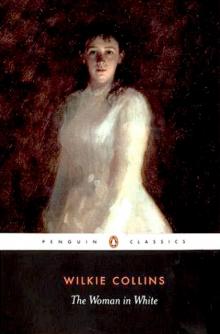 The Woman in White
The Woman in White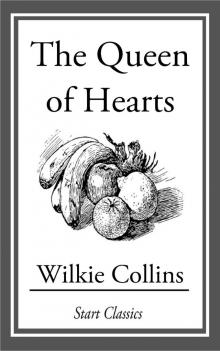 The Queen of Hearts
The Queen of Hearts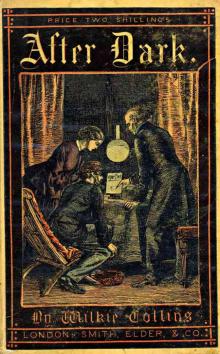 Miss Jeromette and the Clergyman
Miss Jeromette and the Clergyman Man and Wife
Man and Wife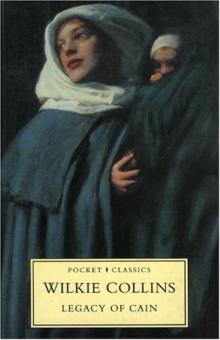 The Legacy of Cain
The Legacy of Cain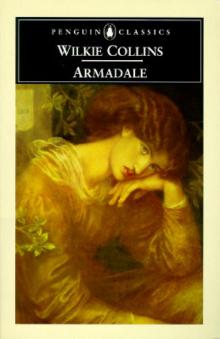 Armadale
Armadale The Frozen Deep
The Frozen Deep John Jago's Ghost or the Dead Alive
John Jago's Ghost or the Dead Alive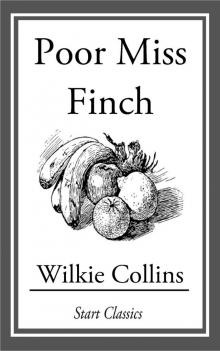 Poor Miss Finch
Poor Miss Finch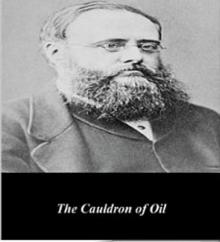 The Cauldron of Oil: A Case Worth Looking At
The Cauldron of Oil: A Case Worth Looking At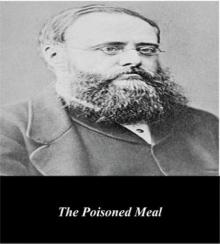 The Poisoned Meal
The Poisoned Meal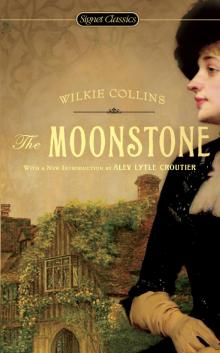 The Moonstone
The Moonstone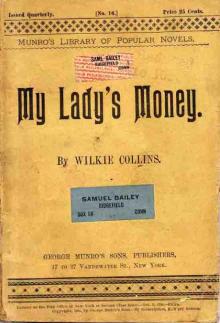 My Lady's Money
My Lady's Money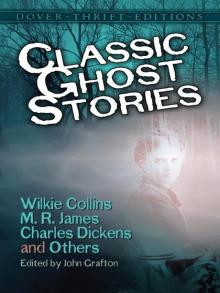 Classic Ghost Stories
Classic Ghost Stories Jezebel's Daughter
Jezebel's Daughter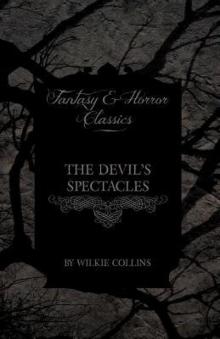 The Devil's Spectacles
The Devil's Spectacles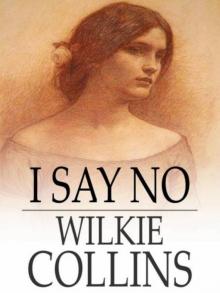 I Say No
I Say No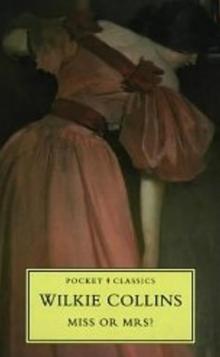 Miss or Mrs.?
Miss or Mrs.?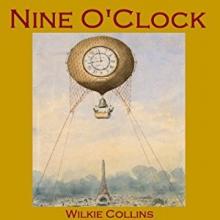 Nine O'Clock
Nine O'Clock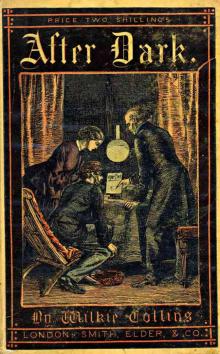 The Lawyer's Story of a Stolen Letter
The Lawyer's Story of a Stolen Letter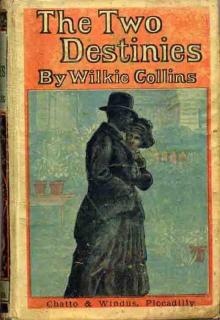 The Two Destinies
The Two Destinies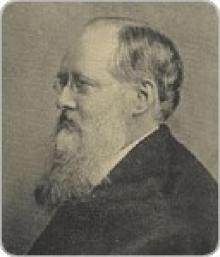 Mr. Percy and the Prophet
Mr. Percy and the Prophet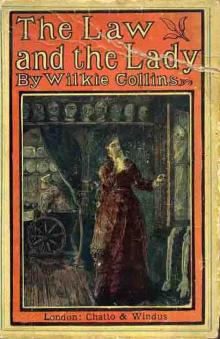 The Law and the Lady
The Law and the Lady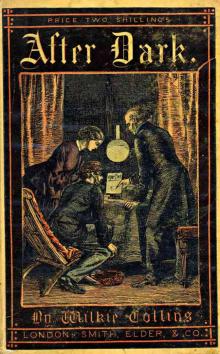 The Nun's Story of Gabriel's Marriage
The Nun's Story of Gabriel's Marriage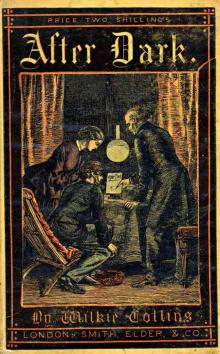 After Dark
After Dark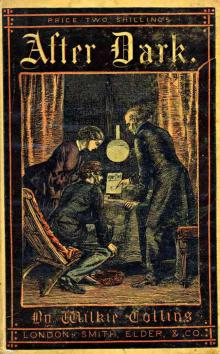 Mr. Captain and the Nymph
Mr. Captain and the Nymph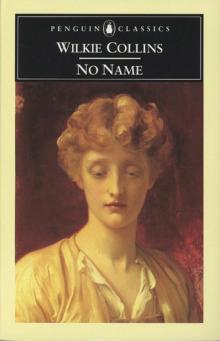 No Name
No Name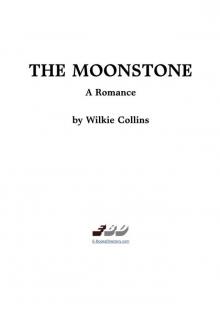 The Moonstone (Penguin Classics)
The Moonstone (Penguin Classics) Antonina
Antonina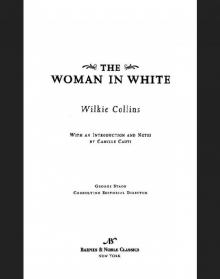 Woman in White (Barnes & Noble Classics Series)
Woman in White (Barnes & Noble Classics Series)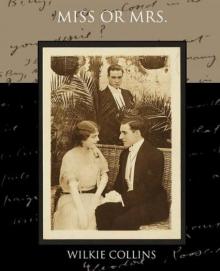 Miss or Mrs
Miss or Mrs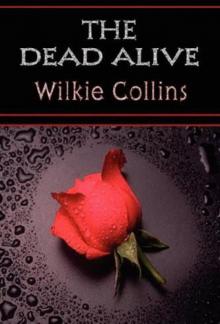 The Dead Alive
The Dead Alive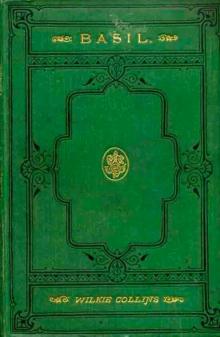 Basil
Basil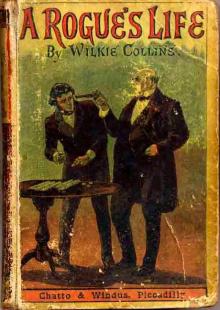 A Rogue's Life
A Rogue's Life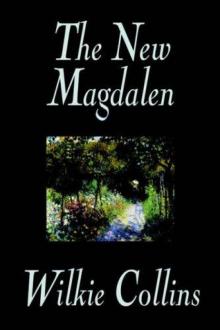 The New Magdalen
The New Magdalen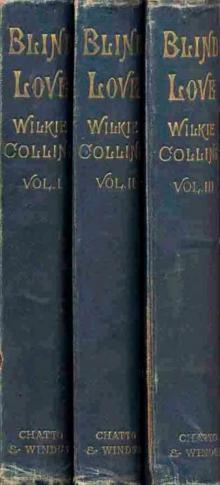 Blind Love
Blind Love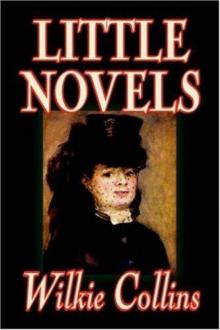 Little Novels
Little Novels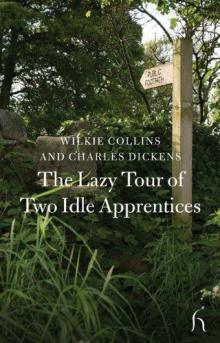 The Lazy Tour of Two Idle Apprentices
The Lazy Tour of Two Idle Apprentices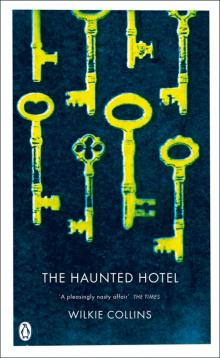 The Haunted Hotel
The Haunted Hotel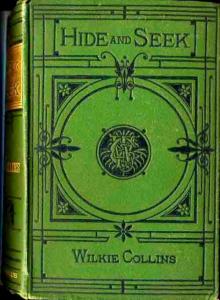 Hide and Seek
Hide and Seek